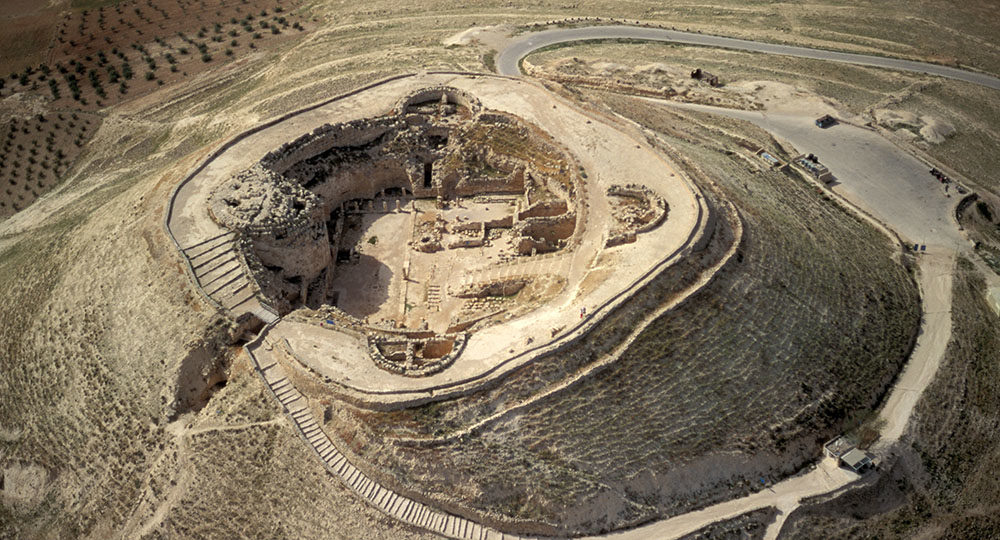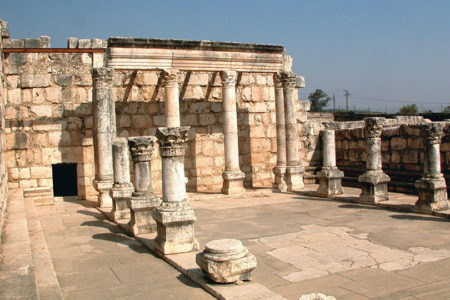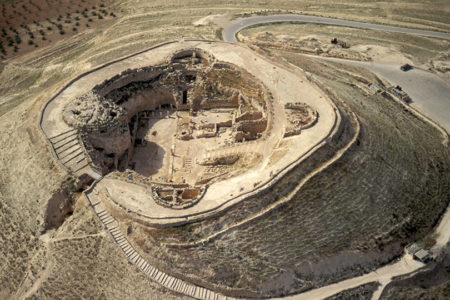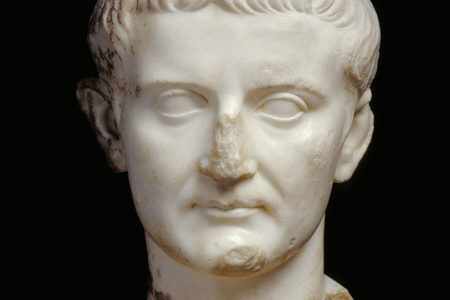Herod the Not-So-Great
What kind of a man would build a temple to God and kill babies? What kind of a man would give generously to strangers and murder members of his own household? Such a man would be considered a brute. And such a man was Herod the Great, the ruler over the land of the Jews at the time of Christ’s birth.
The bulk of what we know about Herod comes from the first-century Jewish historian Josephus. Three times Josephus referred to Herod as “the Great,” a common title in the ancient world. However, Herod’s life reveals that he was not so great after all. Complex and contradictory, Herod could be both tenderhearted and abominably monstrous.
The date of Herod’s birth is unknown, but it was probably around 72 B.C. His pedigree was neither regal nor Jewish. His father, Antipater, was an Idumean. The Idumeans were Edomites, descendants of Esau. The Hasmonean ruler John Hyrcanus (r. 135–104 B.C.) conquered the Idumeans and compelled them to receive circumcision and observe Jewish laws. Although Josephus claimed the Idumeans were afterward Jews, it is inconceivable that such a forced conversion would have changed any heart.
Antipater married an Arabian woman who bore him four sons (Herod being the second) and a daughter. A reputable man among the Idumeans, Antipater became an expert in regional politics, ingratiating himself to both Jewish and Roman leaders. Julius Caesar made him governor of Judea. Once in office, Antipater promoted his firstborn son to governor over Jerusalem and Herod to governor over Galilee.
Though a young man at the time, Herod showed himself to be swift and decisive. Jewish leaders, however, complained to Hyrcanus II—the Jewish high priest and de facto king—that Herod had put someone to death without Sanhedrin authority. Also, Antipater was embezzling government money and, together with his sons, conniving to take over Hyrcanus’s throne.
Easily swayed, Hyrcanus agreed to put Herod on trial before the Jewish Sanhedrin. Herod appeared, but not without an intimidating contingent of bodyguards. He escaped condemnation by fleeing to Syria, vowing never again to go before the Sanhedrin. In fact, when he took power as king years later, one of Herod’s first acts was to kill all but one of the Sanhedrin members who had put him on trial.
Herod continued to climb the political ladder. Through bribery, he purchased a promotion to general of the Syrian forces. And he demonstrated eagerness in collecting Roman taxes. When Jewish leaders complained to Mark Antony about Herod usurping Hyrcanus’s authority, Herod bribed Antony into not hearing their charges. He also bribed Antony into making him tetrarch (governor of one-fourth of a province).
In 40 B.C. Hyrcanus’s nephew, Antigonus, with the aid of the Parthians, attacked Judea. Outmaneuvered, Herod fled to Antony at Rome. While there, Antony appointed Herod king of the Jews since (1) Antony already hated Antigonus; (2) Herod’s father, Antipater, had once befriended Antony; and (3) Herod offered Antony more money. The Roman senate approved the appointment. Nevertheless, it took Herod another three years before he could defeat Antigonus and claim the throne in 37 B.C. Herod later bribed Antony to execute Antigonus.
Herod the Brave
Despite Herod’s egregious political maneuverings, he occasionally demonstrated courage and leadership. When he fled from Antigonus, Herod escaped Jerusalem by night, leading an entourage of almost 10,000 despondent people, including his personal family and relatives. Herod encouraged them as they went and brought them safely to Idumea, though not without having to fight a number of skirmishes along the way.
Herod also was an excellent hunter, a skilled horseback rider, and an accurate marksman. Whenever a battle needed to be engaged, Herod was there.
On one occasion Herod was bringing military reinforcements to Antony. Suddenly, a large force of barbarians ambushed Herod’s forward soldiers. While his men retreated, Herod charged the enemy, attacking ferociously. Herod’s men rallied and, with Herod in the lead, gained the victory.
Herod once fought the Arabians who had stopped giving their required tribute to Rome. Herod’s victory seemed sure until a foreign general unexpectedly swooped down on Herod’s army and soundly thrashed it. Around the same time, a great earthquake shook Judea, killing 10,000 people. Herod’s men were completely dispirited. Josephus recorded that Herod mustered up his courage, gave a rousing speech to his men, and went on to defeat the Arabians.
Herod the Beneficent
Although it seems incongruous with much of his character, Herod frequently performed great acts of kindness. During some of his travels he satisfied the physical or financial needs of the people he visited. He helped a town rebuild after a devastating war. He helped numerous cities and regions construct temples. He also reinstated olympic games.
For his own subjects, Herod provided grain during a major famine. He cut taxes at least twice. He appealed to higher authorities and won a judgment on behalf of the Jewish people in Asia, who were being deprived of their rights.
Herod’s motives and methods of accruing wealth, however, overshadowed his philanthropy. Most of his kind deeds were self-serving—a means to ensure good relations and pacify the disgruntled minions. He taxed his people heavily, stole from the wealthy, and on one occasion even raided King David’s tomb!
Herod the Builder
When it came to construction, however, Herod was without peer. In Antioch, Syria (the eventual location of Paul and Barnabas’s sending church), Herod repaved the 2.5-mile-long main street with polished stone, putting cloisters along both sides.
In Judea, Herod created the enclosure surrounding the Cave of Machpelah in Hebron, where the Jewish patriarchs are buried. He also constructed the magnificent seaside city of Caesarea that included a temple for Augustus, a theater, and a man-made harbor of more than 656,000 square feet.
Especially intent on building fortresses, Herod fortified ancient Samaria, renaming it Sebaste; rebuilt Macherus, east of the Dead Sea, where Herod’s son Antipas later beheaded John the Baptist (Mt. 14:10); restored Alexandrium, a fortress 17 miles north of Jericho; and revived Hyrcania, a citadel nine miles northeast of Jerusalem that became his center for imprisonment, torture, and execution.
Herod also built and named after himself a fortified palace called Herodium. Located five miles southeast of Bethlehem, it sat on a man-made hill in the middle of a plain—the spot where Herod had defeated a contingent of Jewish soldiers who had attacked his company as he was fleeing from Antigonus. The fortress was circular, had high towers, and was accessible only by climbing 200 steps of polished stones.
Herod’s most impressive fortress was Masada. A natural mountain stronghold on the southwestern shores of the Dead Sea, Masada rises 1,300 feet into the air. The Hasmoneans originally constructed the fortifications, but Herod completely refurbished them.
An imposing structure, Masada had a 4,500-foot-long double stone wall intersected by more than 30 towers, with enough weapons to outfit a small army. Masada was also Herod’s winter palace, having all the comforts of home.
But Herod’s greatest work was in Jerusalem. There, on the northwest corner of the Temple Mount, he built for himself a magnificent palace fortress and named it Antonia, after his friend Mark Antony. This was the fortress where Paul was later examined with flogging (Acts 21:32, 34–35; 22:24).
And Jerusalem was the site of Herod’s crown jewel of construction: the Temple Mount itself. He doubled the size of its platform. Some of the stones used for the retaining walls were up to 35 feet in length and weighed as much as 70 tons. New gates were created, as well as beautiful cloisters around the perimeter. And the Temple building itself was modified.
Herod began work on the Temple compound in 20 B.C. The building renovations were finished in 18 months. The cloisters and outer enclosures took eight years to complete. However, certain aspects of the project were still under construction in the days of Jesus (Jn. 2:20) and were not fully completed until A.D. 63, seven years before the Romans burned it to the ground.
Herod the Butcher
Whatever Herod’s virtues, they were decidedly overshadowed by his profound paranoia. He was the classic paranoid tyrant. His fortresses reflected his mentality. He lived with constant fear and suspicion. He had spies everywhere, looking for seditious activity. Herod would occasionally disguise himself as a commoner and mingle among the people at night, listening for conspiracies. Suspected dissidents were captured and tortured. Anyone who did not swear allegiance to Herod was persecuted and/or killed.
To be sure, Herod had no qualms about killing. He killed the 2,000 survivors of five cities that had rebelled against him. He had his brother-in-law drowned. He executed his uncle, his wife’s grandfather, his wife, his mother-in-law, and three of his sons. He murdered faithful followers, servants, friends, soldiers, pious men, and relatives—often on the flimsy evidence of rumors or coerced confessions.
In the last days of his life, Herod arranged for all the prominent Jewish leaders of the country to be rounded up, placed in a hippodrome, and executed upon word of his demise. He wanted to ensure there would be mourning throughout the land after he died. Fortunately, those orders were never carried out.
One of Herod’s most barbaric acts is recorded in Matthew 2:16. Shortly after Jesus’ birth, Herod had all males two years old and under in and around Bethlehem slaughtered. He was endeavoring to exterminate the promised Messiah.
In the spring of 4 B.C., at almost 70 years of age, Herod died of an excruciatingly painful and foul disease. He had reigned 34 years as an Idumean who had no biblical right to the throne. Insecure in his identity, Herod’s chief desire was to leave a lasting legacy. As Josephus described him, “For being a man ambitious of honor, and quite overcome by that passion, he was induced to be magnificent, wherever there appeared any hopes of a future memorial, or of reputation at present.”1
Herod’s actual legacy was that of a godless, selfish, ambitious man controlled by fear. His relationships were sown with lies and distrust. And lies and distrust are what he reaped in his own family and among those who served him. (See Proverbs 29:12.) Herod exemplifies what happens when power, pleasure, and prestige take precedence over people.
Despite his architectural accomplishments, Herod will always be remembered as the imposter king of the Jews who attempted to murder the true King of God’s Chosen People. And for that act alone, Herod was not so great. No, not great at all.
ENDNOTE
- Josephus, Antiquities 16.5.4







